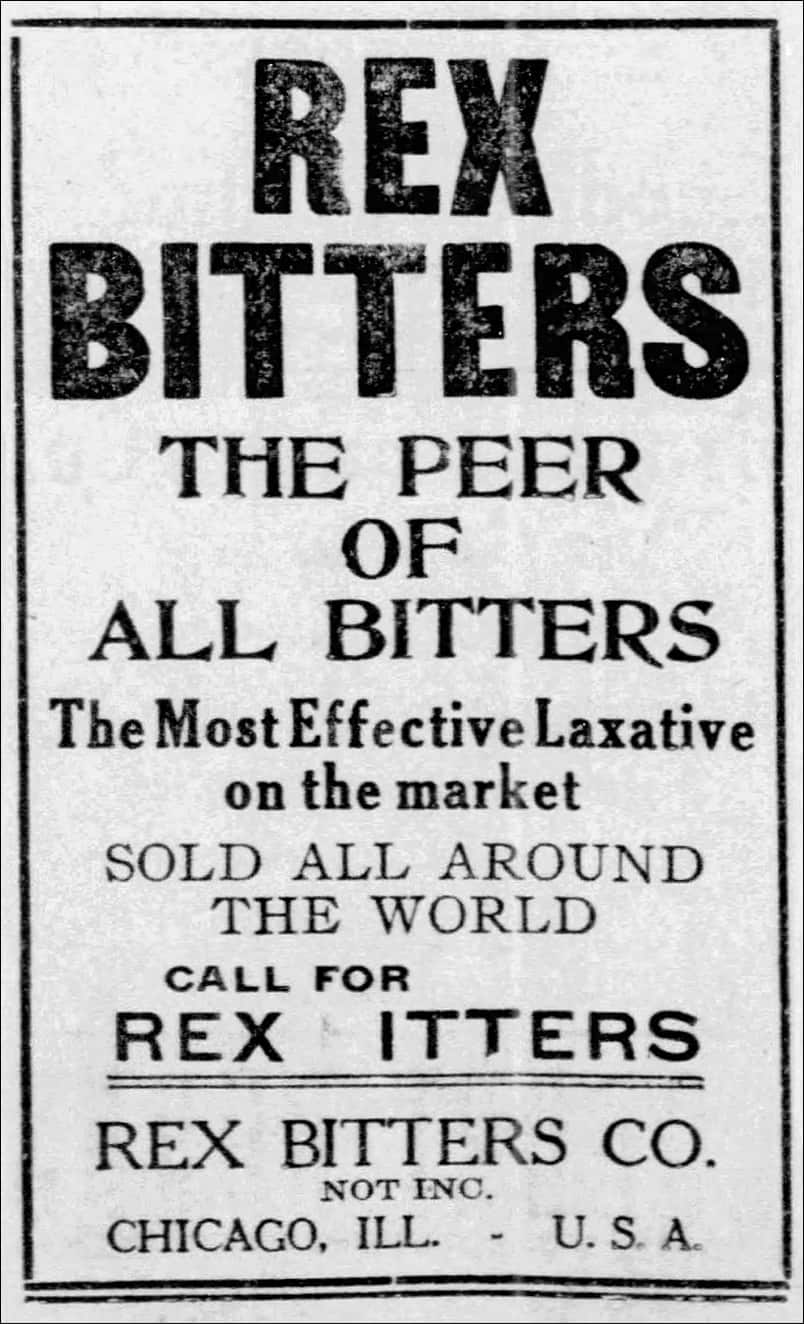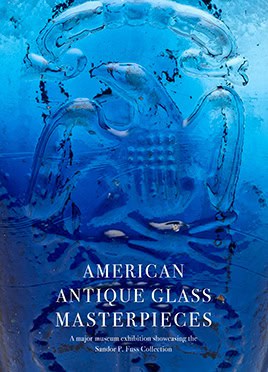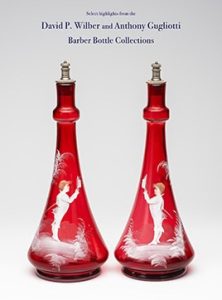If you can’t do business, drink Rex Bitters
Chicago
23 November 2018 (R•032319)
![]() Here is what I call a telephone bitters. A bitters product so late that you could call your favorite saloon, liquor or drug store and order a case of Rex Bitters using your Chicago Telephone Company issued telephone, if you were fortunate enough to have one. Illinois Bell would not form until 1923 when they began automatic telephone service in Chicago.
Here is what I call a telephone bitters. A bitters product so late that you could call your favorite saloon, liquor or drug store and order a case of Rex Bitters using your Chicago Telephone Company issued telephone, if you were fortunate enough to have one. Illinois Bell would not form until 1923 when they began automatic telephone service in Chicago.
The first Rex bottles were amber squares followed by amber and clear round or cylinder bottles. There are a number of variants but we will look at the main examples for now. The primary listings within the Carlyn Ring and W.C. Ham Bitters Bottles book are as follows:
R 41 REX BITTERS (Round Cylinder)
REX / BITTERS / CO. / CHICAGO // c //
Rex Bitters Co. 1712 – 1714 Michigan Avenue, Chicago, Illinois
11 1/2 x 3 (7 1/2)
Round, Clear & Amber, ABM
Label: Drink Rex Bitters for your stomach’s sake. Good in all cases of biliousness, constipation, liver, kidney and blood troubles. Fine as a bracer in any case of over-indulgence in eating or drinking. Get Yours. You’ll Need It.
R 43 REX BITTERS, NOTHING ELSE (Square)
REX / KIDNEY & LIVER / BITTERS // f // REX BITTERS / NOTHING ELSE // f //
Overbrook & Co., Wholesale Liquors, Boston, Massachusetts
10 x 2 3/4 (8)
Square, Amber, LTCR, Common
R 44 REX KIDNEY AND LIVER BITTERS (Square)
R 44 REX KIDNEY AND LIVER BITTERS (Square)
REX ( l>s ) KIDNEY ( au ) / AND / LIVER ( ad ) / BITTERS ( s>l) // THE BEST LAXATIVE / AND BLOOD PURIFIER // f //
9 5/8 x 2 3/4 (7 1/2)
Square, Amber & Green, LTCR, Common (never seen a green square? Round, green screw cap bottles used in 1941)
Very similar to Lash’s Kidney and Liver Bitters
Lash’s Bitters | San Francisco – Chicago – New York • PART ONE | The Bottles
Lash’s Bitters | San Francisco – Chicago – New York • PART TWO | History
Lash’s Bitters | San Francisco – Chicago – New York • PART THREE | Humorous and Clever Advertising
Collectors tend to shy away from these later bitters though every serious bitters collector should have a Rex Bitters bottle as it tells a story. A story of the tail end of bitters production prior to Prohibition in United States, which in 1920 essentially shut the alcohol-laced bitters business down. Well, Prohibition tried to, as some bitters were quickly repurposed or disguised as medicines and sold illegally as we will see. In 1933, with the end of Prohibition, some of the more resilient bitters came back to life.
Rex Bitters Company
On December 3, 1904, three slick city lawyers incorporated Rex Bitters Company in Chicago with $5,000 in initial capital. William Edward Slaughter was set up as President and James P. McConnell was Secretary. The company would manufacture drugs and medicines from their 1545 Michigan Avenue address. A few months later, in 1905, the company placed many “Agents Wanted” ads in the Chicago Tribune and other regional papers looking for salesmen to work salary or commission. The business must have taken off fast as the group of men increased Rex Bitters Company capital stock from $5,000 to $50,000 later in the year.
Rex is Latin for “king” so I propose this is the origin of the Rex Bitters name though ‘℞’ is a symbol meaning “recipe”. It is sometimes transliterated as “Rx” or just “Rx”. This symbol originated in medieval manuscripts as an abbreviation of the late Latin verb recipere, specifically the second person singular imperative form recipe meaning “take”, thus: “take thou”. The Rex Bitters brand and graphics seem to play on these RX letters from their name throughout their years of advertising. Earlier trademark logo graphics placed a typographic “REX” diamond on a pyramid and said, “Nothing Else, As Old As The Pyramids.” An obvious king reference. Later, typography connected the “RX” letters under the”E”. [see above]
Rex Bitters Company primarily sold Rex celebrated Kidney & Liver Bitters (later just Rex Bitters). They also put out Rex Celery and Iron Compound, Rex Elixir of Bitter Wine, Rex Ginger and Brandy Tonic, Rex Ginger, Rex Hoarhound Tonic and Rex High Ball Cordial. They advertised the bitters as curing biliousness, malaria, chills and fever, neuralgia, constipation, pain in back, dyspepsia, sick headache, indigestion, sour stomach, and all “affections” of the kidneys and liver. They said it was compounded from barks, herbs, vegetables and said it acts on the stomach and bowels, kidneys and liver without painful feelings. They forgot to mention that it was high in alcohol content, twenty-two percent.
the label advised customers to give children a teaspoonful twice a day and at bedtime “if required.”
Despite this high alcoholic content, the label advised customers to give children a teaspoonful twice a day and at bedtime “if required.” Rex Bitters merchandising emphasized that it had been recognized as a medicine by the Internal Revenue Department which had slapped a special tax on such products to help pay for the Spanish-American War.
William Edward Slaughter
William Edward Slaughter was born in Washington D.C. in 1871. Both his parents were also from the District of Columbia. He grew up in New Orleans and was raised by Lizzie Seldon according to an 1880 U.S. Federal Census report. An 1890 New Orleans City Directory lists him as a student boarding at 158 N. Rampart. He reportedly completed high school but did not attend college. On September 7, 1895, Slaughter married Maggie May Fergusson in Washington, D.C. Both are pictured above according to Charles Wilson (great-great grandson). They would remain in Washington until 1900 or so where Slaughter would work as an insurance agent. Eventually, they would have three children, Wallace, Consuelo P. and William Slaughter Jr.
Slaughter must have observed and experienced the huge popularity of bitters in New Orleans as he moved to Chicago sometime around 1902 and started Rex Bitters Company. New Orleans was a pretty racy town and he brought some of that spirit with him to Chicago and used it in his marketing campaign. In particular, he used sex to sell his bitters. Only a few bitters companies were brazen enough to do this. They already had the women against them with the Temperance Movement which was gaining steam.
Racy Advertising
The risqué, suggestive sexual overtone advertising would get William Slaughter and his company in quite a bit of trouble as James McConnell, Slaughters partner, was arrested in 1905. This was due to the Chicago Police Chief going after the many Chicago Penny Arcades showing risqué and objectionable pictures. These were really the first peep shows. He also went after the risqué souvenir postal cards canvasing his town and being plastered in windows of drug stores and other retail establishments. The image below was on the opposite side of a Rex Bitters card and was captioned “Heart Trouble.”
Chief Collins wanted to suppress the vulgar picture card and photograph evil that was perverting the morals of the young. This material including some pretty saucy advertising for Rex Bitters. Actually, the initial objectionable material, according to Collins, included two cards, “one bearing a gross picture of a woman and the other a doggerel verse.” Pretty tame nowadays.
It seems as if the town has gone stark mad over vulgar pictures. They have been increasing in number everywhere, till man, woman, and child can’t miss seeing them. The postal cards are bad enough, displayed as they are in windows everywhere and sent through the mails. Worse than the postal cards, however, are the penny arcades. I am going to recommend the revocation of their licenses.”
Chief Collins
This nuisance with the law didn’t seem to bother the gents of Rex Bitters Company as business was booming and men were their primary customers, in saloons, bars and liquor stores. Additionally, Rex Bitters now had satellite offices in New York and St. Louis.
You would not see colorful images of the family, fancily adorned women, children, dogs and cats that populated many Victorian advertising cards on Rex Bitters material. The Rex Bitters cards below certainly demonstrate this point. Provocative image coupled with suggestive words. Advertising 101.
Some of the cards that Rex Bitters Company put out were pretty darn funny as they did not depict beautiful women in suggestive poses and situations. They seem to suggest that Rex Bitters will give you your manhood and that it is just too bad if women didn’t get it. Slaughter had a number of these tongue-in-cheek cards.
Complaining Women
This all would escalate in 1907 when William Slaughter himself was taken into custody at his home after a raid at the Rex Bitters Company. The Chicago Mayor and the same Chief Collins said it was because of women who had made numerous complaints of the offensive pictures and literature used to advertise Rex Bitters. The chief said that he had also heard that models were visiting the offices of Rex Bitters Company and posing for pictures.
The chief said that he had also heard that models were visiting the offices of Rex Bitters Company and posing for pictures.
Two examples of Rex Bitters studio model shots are represented below. During the raid, so much advertising material was seized that it would not fit in the patrol wagon so three express wagons were called to the scene. Apparently $5,000 worth of books and cards were taken. Slaughter was taken to the Harris Street station and released an hour later after posting a $1,000 bond. Eventually he was charged and fined $200.
Business was Booming but Storms on the Horizon
By 1910, business was booming and Rex Bitters was being sold widely in the Chicago area. It was time to expand. Wanted ads were posted in 1912 newspapers looking for “Bright, Wide Awake, Hustling men; one for Wisconsin, one for Ohio, one for Pennsylvania and one for New York. Rex Bitters Company was now located at 1712-1714 South Michigan Avenue and said salesmen, with gilt edged references, on commission, could make from $100 a week and up. That’s pretty good.
This must have been an interesting and stimulating office environment with a growing company in Chicago at that time. A Michigan Avenue address, racy advertising, models coming and going, cops raiding the office, what else could you have? Well, in 1911, Rex Bitters Company placed local ads saying that they were selling furs at their 3rd Floor office, for “a limited time”. Why not? I wonder what truck these fell off?
We need to understand that organized crime was in its infancy in Chicago in 1910. Al Capone was only 11 or so at that time. That year, Chicago police arrested over 200 known Italian gangsters known as Black Hand members in a raid in Little Italy. Also from January 1, 1910 to March 26, 1911, thirty-eight people were killed by Black Hand assassins, many by the unidentified assassin known only as “Shotgun Man”, between Oak Street and Milton Street – “Death’s Corner” – in Little Italy. With this, on March 15, 1910, the Chicago Vice Commission was organized by Chicago Mayor Carter Harrison, Jr., to be able to bring an end to the Levee District brothels and panel houses. Things would not get much better in Chicago for some time, with Prohibition looming. Rex Bitters is woven into this fabric.
thirty-eight people were killed by Black Hand assassins, many by the unidentified assassin known only as “Shotgun Man”, between Oak Street and Milton Street – “Death’s Corner”
Running A Blind Pig
The Pure Food and Drug Act in 1906 did not spell good news for the Rex Bitters Company. This act was set up for preventing the manufacture, sale, or transportation of adulterated or misbranded or poisonous or deleterious foods, drugs, medicines, and liquors, and for regulating traffic therein, and for other purposes. On August 23, 1912, Congressman Joseph Swagger Sherley’s proposed amendment, the Sherley Amendment, to Section 8 of the Pure Food and Drug Act, was enacted. It prohibited ‘false and fraudulent’ labeling of a product (though not advertising). The red tape was piling up.
There are numerous newspaper notices in American papers, in the mid 1910s, relating to saloons and bars being raided. Rex Bitters seems to be mentioned often. In the notice below from 1913, it says a “soft drink” emporium was raided and Rex Bitters was being sold illegally. They were “Running a blind pig” which is basically a speakeasy, an illicit establishment that sells alcoholic beverages. Along with the bitters, the raid resulted in the confiscation of “two barrels of quantities of whiskey, wine, champagne, ginger, creme de menthe, and other intoxicants.”
Prohibition
This Rex Bitters ‘cat & mouse’ game would continue through the 1910s as the Rex Bitters Company expanded. With Prohibition taking effect in January 1920, this would all come to a boiling point. In October of that year, a U.S. judge specifically targeted the heads of Rex Bitters Company and John Lamson, president of Pond’s Bitters company. The judge went on to say, and I want the presidents, not the office boys or any other minor officials of these two companies.”
And I want the presidents, not the office boys or any other minor officials of these two companies.
Subpoenas were issued after a jurist had examined 60 quarts of liquor that had been seized by federal agents at local Chicago saloons. According to a newspaper report, “The 60 quarts were piled high in front of the jurist when he reached over and at random picked out two bottles. The first was that of the Rex Bitters Company, labeled ’22 percent alcohol’. The second was that of the Pond’s Bitters Company labeled ’20 percent alcohol’. These are rare remedies indeed to be found in saloons when Prohibition laws are in force,” said the jurist. Each of the defendants was fined $500.
All this must have pushed William Slaughter out as he moved on to run a glove manufacturing factory later in 1920. By 1930, he is the the manager of an electrical company in Chicago. After his death, Maggie M. Slaughter is found living in Fort Lauderdale, Florida, in 1955.
The company goes dark during the rest of Prohibition. There are no ads and no business listings until the Rex Bitters Company is reborn in 1935 as Rex Products Company. They are “Back on the market.”
Advertising is again posted wanting financially responsible distributers and liquor dealers to job and sell the famous Rex Bitters in Illinois and surrounding states. The ads state that Rex Bitters was a nationally known product before prohibition, and a big seller. The company is now located at 4301 Grand Avenue in Chicago.
 Rex Bitters, now using green bottles with screw tops (above), would rise again and sell all the way up to 1941, when another big event would pretty much reshape the world and quiet Rex Bitters. Interesting, their last offices where noted as being in the Chicago Board of Trade building. Not to shabby at all.
Rex Bitters, now using green bottles with screw tops (above), would rise again and sell all the way up to 1941, when another big event would pretty much reshape the world and quiet Rex Bitters. Interesting, their last offices where noted as being in the Chicago Board of Trade building. Not to shabby at all.
There would be periodic advertising all the way up to 1957 for a non-alcoholic Rex Bitters cordial that could be used for cocktails. The Rex Bitters wings were finally clipped.
Advertising Trade Cards
The following Rex Bitters advertising card examples in this section are from bitters ephemera authority Joe Gourd.














































